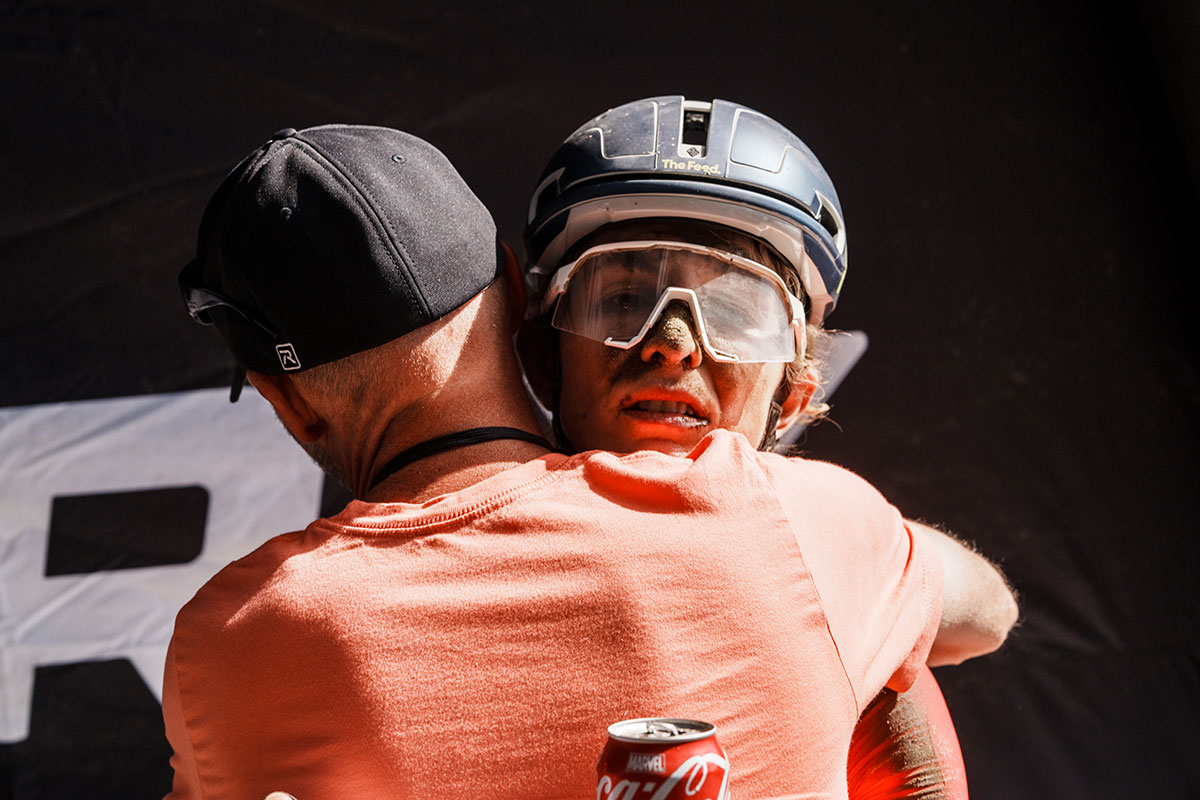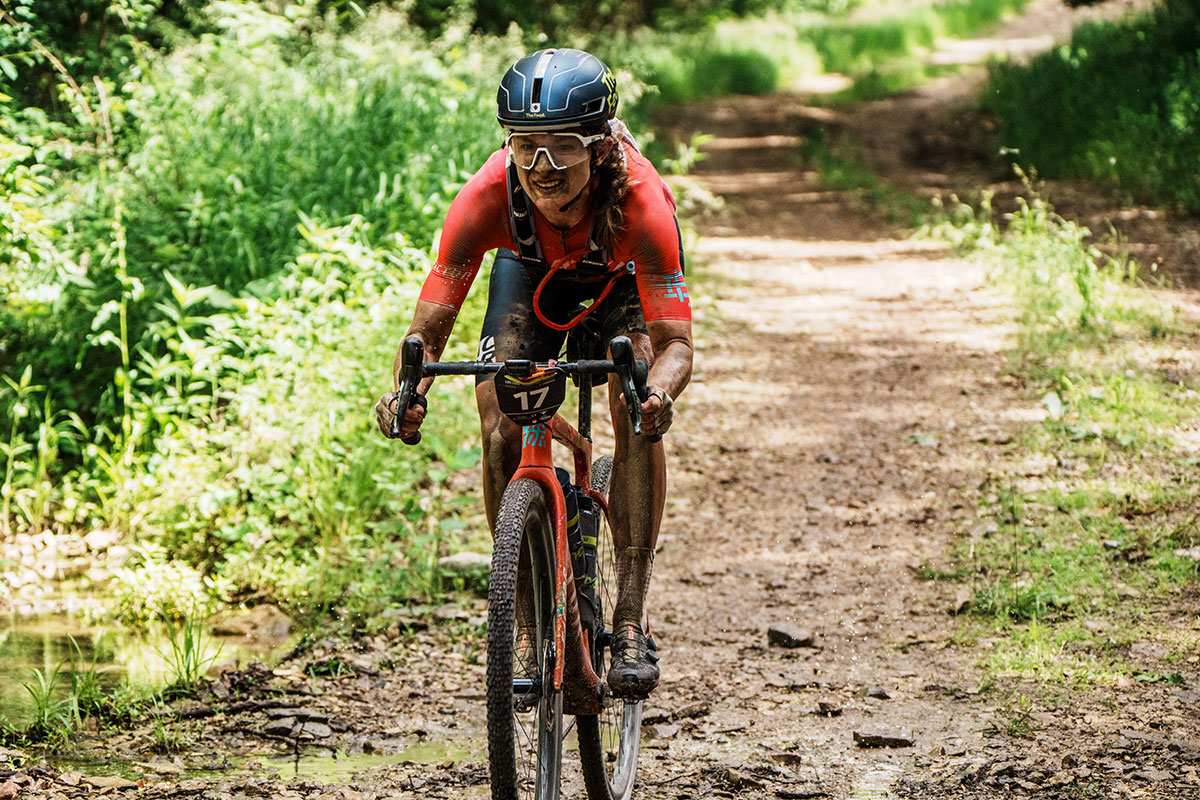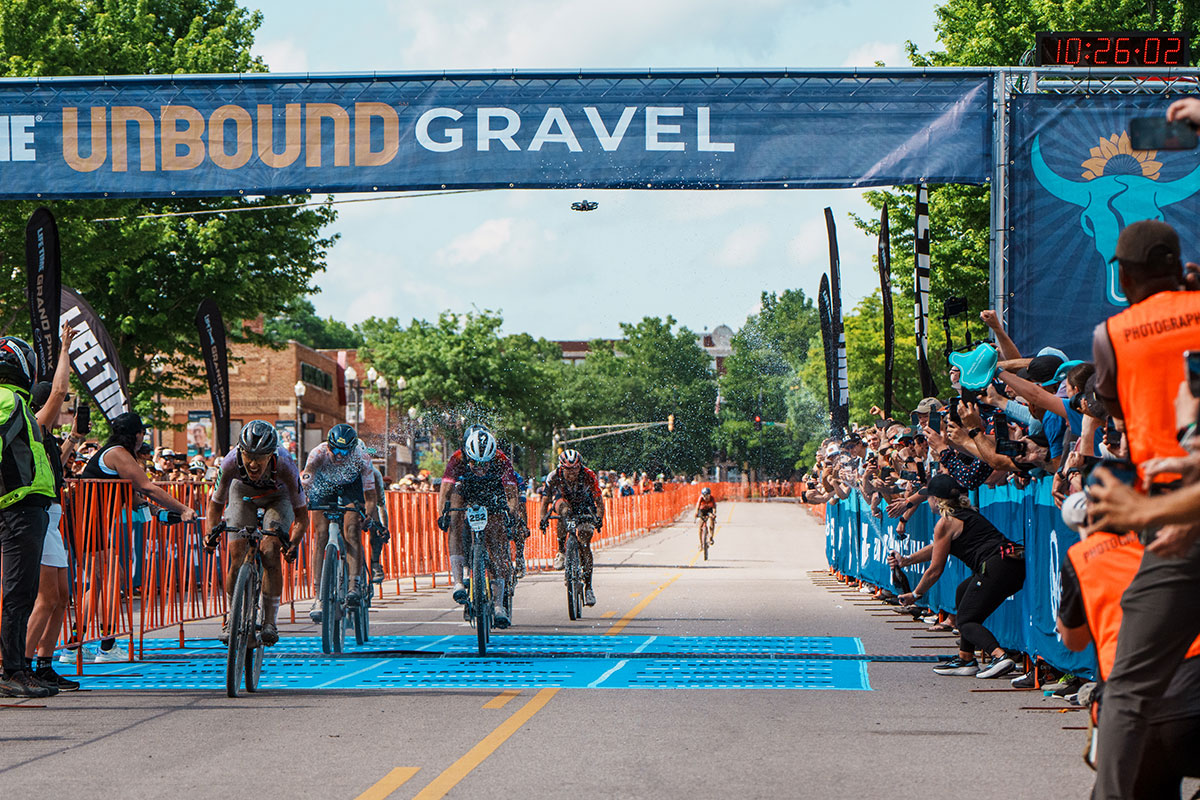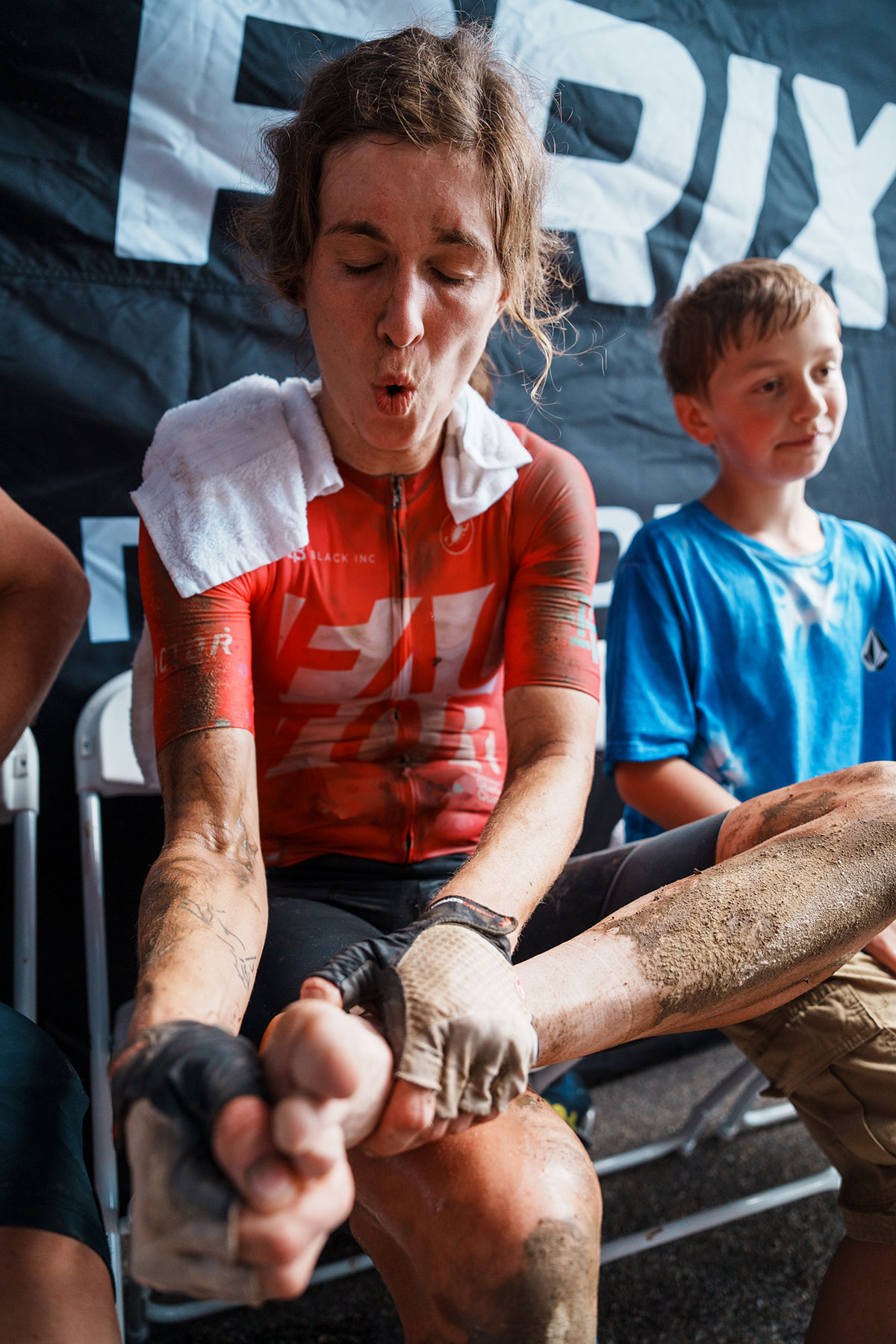
I never imagined sprinting to the line of a 200-mile bike race with nine other women, but on Saturday, history was made in Emporia, Kansas at Unbound Gravel.
The calibre of the women’s gravel peloton has risen tenfold in just a few short years. When I won Unbound 200 in 2021, I averaged 17 mph in what felt like an extended time trial. Although not directly comparable, we averaged 19.4 mph in the female-powered lead group on Saturday.
The effort was anything but a time trial. It was a proper women’s bike race.
Except, of course, for the 2.5-hour long “flyer” I embarked on from miles 80-125. That was a time trial. Unbound has never ended in a sprint for the women of the 200, and that’s why I thought it could work. While being caught was disheartening, it highlights the strength of the women’s peloton.
Still, there was some impact from outside the category while out on that solo move.
During my solo breakaway, I encountered an elite male rider who had fallen off the lead group. When he made a wrong turn, I briefly followed, losing 10-15 crucial seconds. Alone, I might have avoided this mistake.
A bit later on the gravel, I encountered another elite male. After nearly two hours solo, I took a few moments on his wheel and rotated with him briefly, knowing the “anti-drafting” rules were not yet in effect. In hindsight, I regret this decision. My irrational fear was that a group of amateur men on aerobars had caught the women’s field and could be towing them back to me. Seven hours into a race, desperation sets in and your mind goes to interesting places.
Another reason I regret riding with this elite male was the leak in my rear tyre. I paused briefly and hit it with CO2, but my valve was clogged with sealant. This guy mentioned his already five flats, suggesting poor line choice. I can’t blame my flats on someone else’s line, but isn’t it ironic? Perhaps this was the universe talking to me. I quickly lost my lead and rode the final 80 miles at 14 psi.
The sidewall tear I experienced in 2021 would’ve ended my race in 2024. In 2021, I lost 20 minutes repairing this flat at mile 80. I would later spend four minutes at the second aid station, swapping rotors and wheels. This year, I barely paused for 20 seconds at each aid station, knowing I needed to move quickly as attacks flew through.

Refining rules for fairness
At the beginning of the year, I was part of an athlete advisory group collaborating with Life Time. We focused on refining start protocols and drafting rules within the series. Despite discussing “anti-drafting rules,” Life Time hesitated to implement them at a marquee event like Unbound Gravel, or “the race everyone loves to hate.”
On these advisory calls, we advocated for increased intervals between start times. Life Time responded by expanding the time gaps between pro men and pro women by 15 minutes, and then after the pro women’s start at 6:05 a.m. CDT, the amateurs in the 200-mile event departed on the same route 25 minutes later.
Gravel races necessitate separate starts and “anti-drafting” rules to ensure fairness. Mass starts often feel arbitrary, relying too heavily on external factors. Given the increased time buffer at this year’s event, I know Life Time is open to implementing further changes.
An idea we discussed on the Life Time calls is a penalty for any rider caught drafting off an elite or amateur man. To make it even more enforceable, racers would be told that race officials could be anywhere on the 200-mile course, maybe hiding behind a tree. And if you’re caught drafting, you would be given a 1-hour “stand-down” penalty at the aid station.
We didn’t move forward with this idea because it would need to be proven beyond a doubt and would offer no opportunity for a female racer to appeal the penalty. They would be forced to sit for an hour. We decided the official would need to provide video evidence, and we would also need to refine the definition of drafting further. Things got complicated very quickly, and it makes sense shy Life Time did not implement these “anti-drafting rules” at the biggest gravel race on the calendar.
We had a separate start at last year’s Unbound, 2 minutes after the elite men and 8 minutes before the amateur men. We started fast, almost catching the elite men before the notorious hike-a-bike sector. And when it turned to hike-a-bike, the staggered starts didn’t matter. I wonder how long it would have taken for our race to disintegrate if we had similar conditions this year.

Some pro women still affected by men’s groups
I spoke with fellow racer Hannah Shell, who finished 34th, about how a lack of “anti-drafting” rules impacted her race. She said amateur men would disrupt any group of females she would find herself in, causing it to disintegrate. She also mentioned an amateur male with aerobars catching her group and noted he significantly increased their speed bringing her group back to the first group.
It’s questionable if they would’ve been able to close the gap to the first group if not for his assistance. But it wasn’t against the rules, so it’s fair game. To me, this seems to be a case against aerobars. Amateur men with aerobars can increase the speed of chasers, ultimately impacting the outcome of our race.
Another colleague and friend, Kate Cross, finishing 36th, dealt with mechanical issues early on and between checkpoints 1 and 2 found herself in a chasing group with men and women. She said riding with men after a mechanical was helpful, and it was nice not being alone for 180 miles. She notes her experience “didn’t impact the front of the race, and that's key.”
There is no perfect answer. Anything we come up with will have its flaws. While this adjustment is a step in the right direction, it’s not foolproof.
In adverse conditions like the 2023 Unbound mud pit, the gaps can quickly vanish within the first 20 miles. It could prove too challenging for promoters. Everything could fall apart with bad weather. I think the best solution we have now, which isn’t logistically impossible for race promoters, is to further extend time gaps and eventually implement anti-drafting rules when they are ready to be fully enforced.

The future of women's racing
It’s still imperfect, but it’s the best we can do for now. That’s until we’re able to get our own race day – like the UCI Gravel World Championships where we raced Saturday, and the men Sunday. A lot of things had to go right for Saturday to work out the way it did, and it still wasn’t immune to interference from the elite men or amateur men with aerobars.
Separate days for women's races could be the solution. As we continue to push for equality in cycling, ensuring that women’s races are free from male interference is essential. We can create a fairer, more competitive environment for female cyclists by advocating for these changes.
All we want is a women's race, where we can compete on equal footing without the complications introduced by male competitors. With continued support and adjustments, the future of women’s racing can be bright and unencumbered by these challenges.
And the Golden Ticket? Our own day at Unbound to shine.







